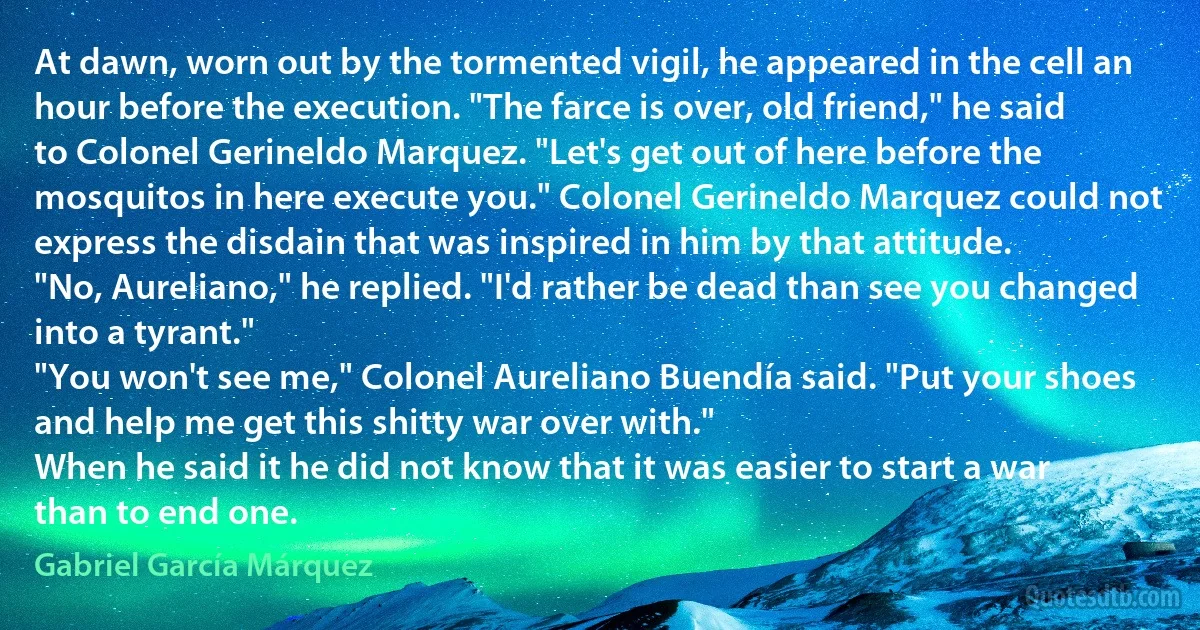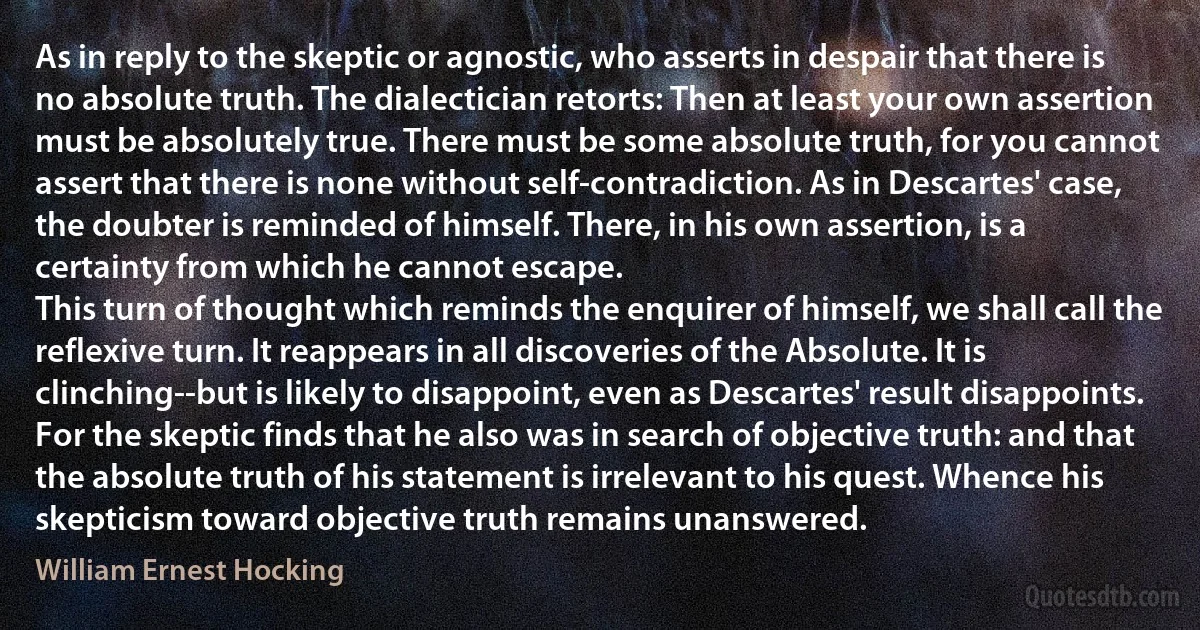Reply Quotes - page 29
I settled everything with Mrs. Grey, while you were putting on your bonnet," replied he. "She said I might have her consent, if I could obtain yours; and I asked her, in case I should be so happy, to come and live with us - for I was sure you would like it better. But she refused, saying she could now afford to employ an assistant, and would continue the school till she could purchase an annuity sufficient to maintain her in comfortable lodgings; and, meantime, she would spend her vacations alternately with us and your sister, and should be quite contented if you were happy. And so now I have overruled your objections on her account. Have you any other?"
"No - none."
"You love me then?" said he, fervently pressing my hand.
"Yes.

Anne Brontë
Sometimes... I've wished I'd never met you - that you hadn't come to take away my impersonal attitude towards the War and make it a cause of suffering to me as it is to thousands of others. But if I could choose not to have met you, I wouldn't do it - even though my future had always to be darkened by the shadow of death....[He asked me] "Would you like me any less if I was, say, minus an arm?..." My reply need not be recorded. It brought the tears so near to the surface again that I picked up the coat which I had thrown off, and abruptly said I would lake it upstairs which I did the more promptly when I suddenly realised that he was nearly crying too.

Vera Brittain
He who invokes history is always secure.
The dead will not rise to witness against him.You can accuse them of any deeds you like.
Their reply will always be silence.Their empty faces swim out of the deep dark.
You can fill them with any features desired.Proud of dominion over people long vanished,
Change the past into your own, better likeness.

Czesław Miłosz
Love is something absolutely unselfish, that which has no thought beyond the glorification and adoration of the object upon which our affections are bestowed. It is a quality which bows down and worships and asks nothing in return. Merely to love is the sole request that true love has to ask. It is said of a Hindu saint (Mirabai) that when she was married, she said to her husband, the king, that she was already married.
To whom?" asked the king.
To God," was the reply.

Meera Bai
Titian was visited on a certain occasion by a company of German travelers.. ..these gentlemen declared that they only knew of one master capable of finishing as they thought paintings ought to be finished, and that was Dürer.. ..To these observations Titian smilingly replied, that if he had thought extreme finish to be the end and aim of art, he too would have fallen into the excesses of Dürer. But though long experience had taught him to prefer a broad and even track to a narrow and intricate path, yet he would still take occasion to show that the subtlest detail might be compassed without sacrifice of breadth, and so produced the 'Christ of the Tribute Money'.

Titian
I was with (Bobby) Charlton, (Denis) Law and Puskás, we were coaching in a football academy in Australia. The youngsters we were coaching did not respect him including making fun of his weight and age...We decided to let the guys challenge a coach to hit the crossbar 10 times in a row, obviously they picked the old fat one. Law asked the kids how many they thought the old fat coach would get out of ten. Most said less than five. Best said ten. The old fat coach stepped up and hit nine in a row. For the tenth shot he scooped the ball in the air, bounced it off both shoulders and his head, then flicked it over with his heel and cannoned the ball off the crossbar on the volley. They all stood in silence then one kid asked who he was, I replied, "To you, his name is Mr. Puskás".

Ferenc Puskás
Prince Antoine Bibesco, when asked (by her mother, Margot Asquith) why his wife didn't do more "good works", such as visiting a hospital, replied, "Dearest Margot, Elizabeth visits a hospital three times a week, with the result that the lame walk, the blind see, and the dumb would speak if they could get a word in edgeways."

Elizabeth Bibesco
On our return homewards, Shelley urged Byron to complete something he had begun. Byron smiled and replied,
"John Murray, my patron and paymaster, says my plays won't act. I don't mind that, for I told him they were not written for the stage-but he adds, my poesy won't sell: that I do mind, for I have an ‘itching palm.' He urges me to resume my old ‘Corsair style, to please the ladies.' John Murray is right, if not righteous: all I have yet written has been for women-kind; you must wait until I am forty, their influence will then die a natural death, and I will show the men what I can do.”.

Lord Byron
He [the chief psychiatrist] complimented me on how brilliant my diagnoses were: "You can smell a delusion, you can ferret out a hallucination, but"-and this has always stuck in my mind-"did you know that this woman grew prize camellias? Did you know that this man played the piano?" "No," I replied, a little bemused, "I wasn't trained to find the good things." But from then on I started to, and ever since I have looked for the good things. What the patient can do, not what he can't. His deficiencies and his weaknesses are so obvious, but his strengths, tragically, are deeply hidden: that is what makes him a patient, a sufferer. For it is his strength alone that will alleviate his suffering.

John Diamond (doctor)
Sukeforth went to Pittsburgh and consulted with Branch Rickey, who had moved from the Dodgers to the Pirate organization and was engaged in a "five-year plan" to recruit young players for the perennial losers. A few days later, Sukeforth went to Montreal to see more of Roberto. That night, while having dinner with Max Macon, the manager, he said with a mischievous grin, "I notice you haven't been playing Clemente much lately." Before Macon could reply, Sukeforth said, "You might as well use him. He's better than anyone we have in Pittsburgh right now. We're going to finish last, and we're going to draft him number one." Then rising from the table, Sukeforth waved and said, "Take care of our boy."

Roberto Clemente
The worse he felt physically, the better he seemed to play. He gave it 100% every day, every play. No one played the crazy right field in Pittsburgh better. I think my favorite quote from him came when Bobby Bragan asked him why he didn't find one batting stance and stick with it. Bob replied, "Bobby, it don't matter how you stand, it matter where you end up!”.

Roberto Clemente
We were in Cooperstown (NY) a few years ago. Baseball's Hall of Fame Museum was full of visitors on a sunny morning. Among them were Pirates and Tigers players in baseball uniforms, sans spikes. They were to meet in an exhibition game an hour later. Roberto Clemente had a small camera whirring every few minutes. He was taking pictures of the enshrined plaques and other mementos of yesteryear's super stars ... Honus Wagner, Ty Cobb, Christy Mathewson, Tris Speaker, Grover Alexander ... to name a few. A Pittsburgher said to Roberto, "This is where you belong. Some day they will be taking pictures of your shrine here." "Thank you," he replied. "I guess a fellow like me has to die to get voted in by the writers."

Roberto Clemente
The insect looked at Jurgen, and its pincers rose erect in horror. The bug cried to the three judges, - Now, by St. Anthony! this Jurgen must forthwith be relegated to limbo, for he is offensive and lewd and lascivious and indecent....
- And how can that be?... says Jurgen.
- You are offensive,... the bug replied, - because this page has a sword which I chose to say is not a sword. You are lewd because that page has a lance which I prefer to think is not a lance. You are lascivious because yonder page has a staff which I elect to declare is not a staff. And finally, you are indecent for reasons of which a description would be objectionable to me, and which therefore I must decline to reveal to anybody....

James Branch Cabell
Pierre, who from the moment Prince Andrew entered the room had watched him with glad, affectionate eyes, now came up and took his arm. Before he looked round Prince Andrew frowned again, expressing his annoyance with whoever was touching his arm, but when he saw Pierre's beaming face he gave him an unexpectedly kind and pleasant smile. "There now!... So you, too, are in the great world?" said he to Pierre. "I knew you would be here," replied Pierre. "I will come to supper with you. May I?" he added in a low voice so as not to disturb the vicomte who was continuing his story. "No, impossible!" said Prince Andrew, laughing and pressing Pierre's hand to show that there was no need to ask the question. He wished to say something more, but at that moment Prince Vasíli and his daughter got up to go and the two young men rose to let them pass.

Leo Tolstoy
(Annie) Besant is correct. To be exact, my Master says it is 4,700 years. The Buddhist figure of 200,000 years refers back to the major decline of spirituality in late Atlantean times which led to the destruction of the Atlantean land-mass and civilization nearly 100,000 years ago. This can be seen as the beginning of a ‘dark age'. [Text is Creme's reply to Q: Besant says that Kali Yuga was the last 5000 years. Buddhism had always said 200,000 years. Which is correct?].

Benjamin Creme
Degas was discussing poetry with Mallarmé; "It isn't ideas I'm short of... I've got too many" [Ce ne sont pas les idées qui me manquent... J'en ai trop], said Degas. "But Degas," replied Mallarmé, "you can't make a poem with ideas. ... You make it with words." [Mais, Degas, ce n'est point avec des idées que l'on fait des vers. . . . C'est avec des mots.].

Stéphane Mallarmé
The stores of history are accessible to every one, and are no more exhausted or impoverished by the hints thus borrowed from them than the fountain is drained by the water which we subtract for domestic purposes. And in reply to the sober charge of falsehood against a narrative announced positively to be fictitious, one can only answer by Prior's exclamation - 'Odzooks, must one swear to the truth of a song?'

Walter Scott
There are thousands of people who feel that it is useless and futile for us to continue talking peace and non-violence - against a government whose only reply is savage attacks on an unarmed and defenceless people. And I think the time has come for us to consider, in the light of our experiences at this day at home, whether the methods which we have applied so far are adequate.

Nelson Mandela
We are bound to further every honest and practical step which the nations of Europe may make to reduce the barriers which divide them and to nourish their common interests and common welfare. We rejoice at every diminution of the internal tariffs and martial armaments of Europe. We see nothing but good and hope in a richer, freer, more contented European commonalty. But we have our own dream and our own task. We are with Europe, but not of it. We are linked, but not comprised. We are interested and associated, but not absorbed. And should European statesmen address us in the words which were used of old, 'Wouldest thou be spoken for to the king, or captain of the host?', we should reply, with the Shunammite woman: 'I dwell among mine own people.'

Winston Churchill



